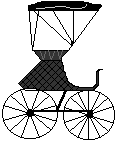 |
|
 |
 |
|
 |
by Carmen Carter
06 Jul 1910 - 30 Jan
2000
|
In 1872 my grandparents, William and Laura Dougan, came to Grant from Rock Creek, Ohio, in a covered wagon drawn by a team of horses. It took nearly three weeks to make the trip. The roads were little more than trails, except for some pole roads where they had to pay toll. They brought their ten month old son, George, with them. There were highway robbers around then because it was thought that people who were traveling must have money. So Grandpa slept under the wagon at night with his shotgun near. They arrived at Grant where they were met by Grandma's parents and brothers who had come there a year earlier. So they stayed with them until they found a place of their own. The lumbering industry was at its peak then. Records show that two and a quarter billion feet of white pine lumber was manufactured in Michigan that year, and fifteen thousand people were employed in the business. Grandpa worked in a shingle mill, but it was not an easy life for them, clearing the land, raising food for their family, cutting wood for the long cold winters, and with everything having to be done by hand. Indians who lived near them would bring hand made baskets to their house and ask Grandma to trade a piece of salt port for one. She never refused. In 1910 they built a new home on eighty acres of land they had cleared three miles west of Grant. That is the year I was born. Eleven months later my mother died and because my father was a railroad man and away much of the time, I went to live with my grandparents. By that time only one of their nine children still lived at home. That was my Aunt Lillian, who was fourteen, so she and Grandma took care of me. Grandpa raised and trained horses to sell because then all farming was done with horses. We traveled either by a surrey drawn by a team of horses or a single horse drawn carriage. Aunt Lillian had her own rig, a single buggy, as they were called, and a brown mare named Fanny. I loved to ride with her. We would hitch Fanny to the buggy and drive the three miles to Grant and put Fanny in the livery stable where she was watered and fed all day for 25 cents. We would visit my other aunt, Daisy Shippy, do our shopping at the combined grocery and dry goods store, then stop at the drug store soda fountain for a glass of root beer before going home. Fanny knew the way and would go straight home and turn into our driveway without us having to say a word to her. Later my Uncle Glenn bought a 1917 Model T Ford and then we could drive to Grant on Wednesday evening and listen to the hometown band concert in the park and at dark watch a free movie. Before driving home we each got a big 5 cent ice cream cone which lasted all the way home. When I was fifteen I went to work at the telephone office in Grant. I was fascinated by the switchboard so I was soon a "telephone girl" (as we were called then). I earned $5 a week at first then got a raise to $6 . I thought I was rich. At night we could pull down a folding bed, turn on the night bell, and go to sleep. If the bell rang in the night we knew that someone needed the doctor or the veterinarian. At that time if the doctor was going out on a call he would always let us know where he could be reached. Grant has grown from a small crossroads with only a very few people to a thriving farm community of over seven hundred and is now known as the Onion Capital of Michigan. The depot where trains once stopped to load logs in lumbering days is now a restaurant where we can relax in an atmosphere of bygone days as we enjoy a delicious meal with old friends and new. |